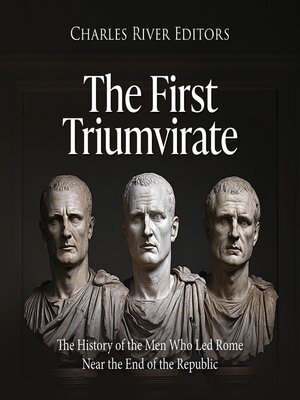The First Triumvirate
audiobook (Unabridged) ∣ The History of the Men Who Led Rome Near the End of the Republic
By Charles River Editors

Sign up to save your library
With an OverDrive account, you can save your favorite libraries for at-a-glance information about availability. Find out more about OverDrive accounts.
Find this title in Libby, the library reading app by OverDrive.



Search for a digital library with this title
Title found at these libraries:
| Library Name | Distance |
|---|---|
| Loading... |
Thanks to his rise in the military and politics, Crassus's renown and riches heavily influenced his contemporaries. In the wake of the Third Servile War, Crassus' patronage helped position Caesar to be appointed governor of Hispania Ulterior. In order to maintain political office, which made him immune from prosecution for his debts, he left for modern day Spain before his praetorship expired. Caesar made this move knowing that governors were immune from prosecution, but governors also had vitally important military responsibilities via command of whatever legions were garrisoned in their territory. It would be as governor that Caesar's military career truly took off, starting with his victories over a couple of local tribes. These military successes earned him the title Imperator, the Roman equivalent of the title of Commander.
Likewise, Caesar was heavily sponsored in his run for Consul by Crassus, and in a brilliant stroke of diplomacy, he succeeded in reconciling Crassus with Pompey, who was Rome's most powerful general at the time. Alongside Pompey and Caesar, Crassus established the First Triumvirate, with Crassus supplying the funds, Pompey the muscle, and Caesar the political clout necessary for governing the city. Though later triumvirates officially wielded power, like the Second Triumvirate (which formed in the wake of Caesar's assassination and included his heir Augustus and longtime general Mark Antony), this First Triumvirate acted behind the scenes to run Rome unofficially.
The triumvirate would come to an end when Crassus met a sudden and unexpected end while campaigning in the east against the Parthians. Ironically, his failed campaign is better remembered than the rest of his life because of the way his reputation brought about his manner of death: ancient writers claimed that shortly after he was killed in fighting, the Parthians poured molten gold down his throat and then used his head as a prop in a play.







